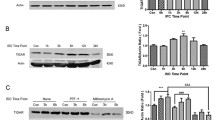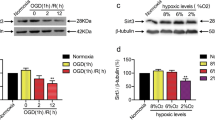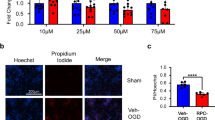Summary
The expression changes of Rars gene in ischemia-injured neurons were investigated by detecting its translational product arginyl-tRNA synthetase (ArgRS), and the inhibitory effects of ischemic preconditioning (IPC) on Rars gene were explored. Both IPC model and prolonged ischemia (PI) model were established by using the classic oxygen glucose deprivation (OGD) method. The primary cultured neurons were assigned into the following groups: the experimental group (IPC+PI group), undergoing PI after a short period of IPC; the conditional control group (PI control group), subjected to PI without IPC; blank control group, the normally cultured neurons. The Rars transcriptional activities and ArgRS expression levels were measured at different time points after re-oxygenation (3 h/6 h/12 h/24 h). Data were collected and statistically analyzed. Compared to the blank control group, the Rars activities and ArgRS levels were significantly increased in PI control group, peaking at the time point of 6 h after re-oxygenation. Rars activities and ArgRS levels were significantly lower in the experimental group than in the PI control group at different time points after re-oxygenation. PI insult can induce an escalating activity of Rars and lead to ArgRS over-expression in primary cultured neurons. IPC can inhibit the increased Rars activity and down-regulate ArgRS expression of ischemia-insulted neurons. This mechanism may confer ischemic tolerance on neurons.
Similar content being viewed by others
References
Ling J, Reynolds N, Ibba M. Aminoacyl-tRNA synthesis and translational quality control. Annu Rev Microbiol, 2009,63:61–78
Anderson LL, Mao X, Scott BA, et al. Survival from hypoxia in C. elegans by inactivation of aminoacyl-tRNA synthetases. Science, 2009,323(5914):630–633
Fu R, Fan YZ, Fan YC, et al. Expression of arginyl-tRNA synthetase in rats with focal cerebral ischemia. J Huazhong Univ Sci Technolog Med Sci, 2014,34(2):172–175
Dirnagl U, Becker K, Meisel A. Preconditioning and tolerance against cerebral ischaemia: from experimental strategies to clinical use. Lancet Neurol, 2009,8(4):398–412
Liu XQ, Sheng R, Qin ZH. The neuroprotective mechanism of brain ischemic preconditioning. Acta Pharmacol Sin, 2009,30(8):1071–1080
Thompson JW, Dave KR, Young JI, et al. Ischemic preconditioning alters the epigenetic profile of the brain from ischemic intolerance to ischemic tolerance. Neurotherapeutics, 2013,10(4):789–797
Sisalli MJ, Annunziato L, Scorziello A. Novel cellular mechanisms for neuroprotection in ischemic preconditioning: A view from inside organelles. Front Neurol, 2015,6:115
Kamphuis W, Dijk F, Bergen AA. Ischemic preconditioning alters the pattern of gene expression changes in response to full retinal ischemia. Mol Vis, 2007,13:1892–1901
Narayanan SV, Dave KR, Perez-Pinzon MA. Ischemic preconditioning and clinical scenarios. Curr Opin Neurol, 2013,26(1):1–7
Ross AP, Christian SL, Zhao HW, et al. Persistent tolerance to oxygen and nutrient deprivation and N-methyl-D-aspartate in cultured hippocampal slices from hibernating Arctic ground squirrel. J Cereb Blood Flow Metab, 2006,26(9): 1148–1156
Nathaniel TI. Brain-regulated metabolic suppression during hibernation: a neuroprotective mechanism for perinatal hypoxia-ischemia. Int J Stroke, 2008,3(2):98–104
Author information
Authors and Affiliations
Corresponding author
Additional information
This project was supported by the National Natural Science Foundation of China (No. 81371453).
Rights and permissions
About this article
Cite this article
Shen, Y., Zhao, Hy., Wang, Hj. et al. Ischemic preconditioning inhibits over-expression of arginyl-tRNA synthetase gene Rars in ischemia-injured neurons. J. Huazhong Univ. Sci. Technol. [Med. Sci.] 36, 554–557 (2016). https://doi.org/10.1007/s11596-016-1624-5
Received:
Accepted:
Published:
Issue Date:
DOI: https://doi.org/10.1007/s11596-016-1624-5




